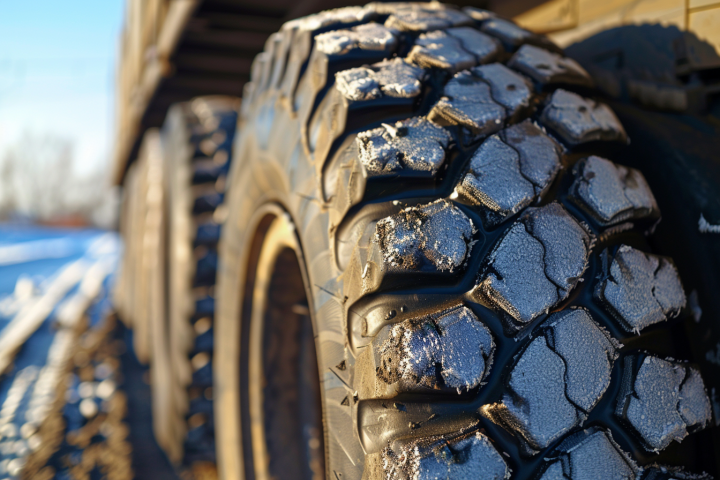Last Updated on August 28, 2024
Navigating the World of Truck Tires Authenticity: Spotting the Fake Tires
The integrity and quality of your tires are more than simply an accessory in the complex and demanding world of transportation; they are the cornerstone of efficiency and safety on the road. For truck drivers and owners, “Navigating the World of Truck Tires: Spotting the Fakes” is a vital resource. It explores the crucial topic of telling real tires from fake ones, an issue that has become more difficult as imitation technologies have advanced. With the expertise and helpful advice in this book, you can ensure that the tires you select maintain the highest quality and safety standards, safeguarding not only your investment but also the lives of others who depend on the functionality of your truck.

Introduction to Tire Authenticity
Differentiating between authentic and fake goods in the complex world of truck tires is not just a matter of taste; it’s a crucial choice that affects investment, performance, and safety. This piece, a portion of the extensive guide from “Tires Easy Truck,” explores the subtleties of tire authenticity and provides truck owners and operators with essential knowledge about recognizing and choosing real tires.
The Importance of Genuine Tires for Trucks
Genuine truck tires are essential for several reasons.
- First and foremost, safety comes first. Genuine tires are made according to strict guidelines and criteria to provide the highest protection when driving. These requirements cover resistance to wear and tear, speed rating, and load capacity. Because they are not subjected to the same stringent testing and quality control procedures, counterfeit tires have a substantial danger of failing and causing accidents, mainly when trucks operate at high speeds and with big loads.
- Second, authentic tires invest in your car’s longevity and performance. Their design delivers maximum traction, fuel efficiency, and longevity. Real tires last longer and retain their integrity, providing reliable performance and lowering the frequency of replacements.
- Finally, there may be legal and insurance consequences for using fake tires. In many places, using inferior tires can result in problems with transportation and safety requirements, leading to fines and legal issues. Moreover, insurance claims may be compromised if fake tires are connected to an accident.
Overview of the Tire Imitation Market
The tire imitation market has increased alongside the rise of the global tire industry. The origins of counterfeit tires are frequently found in areas with loose manufacturing laws, which enable the creation of inferior and often hazardous copies. Not only do these counterfeits target obscure tire companies, but they also commonly target well-known tire brands.
Since counterfeiters are becoming more skilled, it might be difficult to distinguish between real and fake tires. They frequently imitate tread patterns, branding, and other apparent elements precisely. However, these tires require additional material quality, structural integrity, and performance attributes.
Because fake tires are less expensive, there is a growing market for them, deceiving consumers looking for cheaper options. The long-term hazards and expenses considerably outweigh the short-term savings from using fake tires; hence, these cost savings need to be more prominent.
Comprehending and acknowledging the significance of authentic truck tires is essential for safety, functionality, and adherence. Truck owners and operators must be watchful, knowledgeable, and proactive to ensure the tires they buy and use are genuine and dependable. This book will go into further detail in the following sections on recognizing authentic truck tires, where to get them, and how to keep them in good condition for a long time.
Understanding Truck Tire Basics
It is impossible to overestimate the significance of understanding tire fundamentals in the challenging and demanding world of transportation. Both pros and amateurs of “Tires Easy Truck” will find it invaluable to have a basic understanding of the components of truck tires, the characteristics of premium tires, and the distinguishing markings of well-known brands. This section explores these crucial elements to help truck owners make well-informed choices.
The Tire Anatomy of a Truck
A truck tire is a sophisticated assembly of several pieces contributing to its performance. It is more than just a circular piece of rubber. The principal elements consist of:
- Tread: The outermost layer is designed for traction and wear resistance. The tread pattern varies depending on the tire’s intended use, whether for long hauls, off-road, or regional applications.
- Sidewalls: The sides of the tire play a crucial role in determining the tire’s load-carrying capacity and resistance to side impacts.
- Beads are steel cables coated in rubber, anchoring the tire to the rim and ensuring an air-tight fit.
- Carcass Ply: This is the body of the tire, typically made from layers of fabric or steel cords. It lends strength and shape to the tire.
- Belts: Layers of steel, polyester, or nylon are placed between the carcass and the tread to stabilize the tread area and enhance durability.
Key Features of High-Quality Truck Tires
High-quality truck tires possess certain features that set them apart from their lesser counterparts:
- Durability: They are made to endure large loads and lengthy travels without suffering appreciable wear.
- Fuel Efficiency: Modern tire technology enhances fuel efficiency by reducing rolling resistance.
- Traction: Whether it’s rainy or slick, well-maintained tires provide steady traction under all circumstances.
- Heat Dissipation: High-quality tires’ ability to efficiently dissipate heat is essential for preserving tire integrity throughout extended use.
- Load Capacity: They are rated to support particular weight loads and pressures, which is crucial for truck applications.
Popular Brands and Their Hallmarks
In the truck tire market, a few manufacturers stand out, each with its distinctive features:
- Michelin: Known for its reputation for excellence and innovation, Michelin tires frequently have cutting-edge tread patterns and rubber compounds for remarkable durability and fuel economy.
- Bridgestone: Bridgestone is well-known for its durable and long-lasting tires, which perform very well in harsh situations.
- Goodyear: With a strong emphasis on performance and safety, Goodyear tires are known for having exceptional road grip and stability.
- Continental: These tires are praised for providing a well-balanced combination of comfort, longevity, and fuel efficiency.
- Pirelli: Although more well-known in the consumer sector, Pirelli manufactures truck tires renowned for their superior construction and functionality.
Every manufacturer has something unique to offer, and truck owners may choose the best car tires by being aware of these differences.
Anyone working in the trucking sector has to have a solid understanding of the fundamentals of truck tires. Understanding the ins and outs of tires and the characteristics that set premium brands apart improves one’s ability to identify high-quality tires. It supports the effectiveness and safety of trucking operations.
The Risks of Counterfeit Tires
Counterfeit tires present severe concerns in the trucking industry, where margins of error are narrow and stakes are high. Truck owners and operators must comprehend these hazards. This part of the thorough guide from “Tires Easy Truck” clarifies the risks of fake tires, including those related to performance, longevity, safety, and potential legal and insurance consequences.
Safety Concerns with Fake Tires
The primary concern with counterfeit tires is safety. These tires are often made with inferior materials and need more engineering and quality control than genuine brands adhere to. This results in several safety issues:
- Decreased Traction and Handling: The lack of traction that fake tires may provide, particularly in lousy weather, increases the chance of accidents.
- Increased Risk of Blowouts: Due to their subpar design and materials, these tires are more likely to experience blowouts, which can be disastrous while traveling at high speeds or carrying large loads.
- Reduced Braking Efficiency: Fake tires frequently don’t perform up to the norms for stopping power, resulting in longer stopping distances and even accidents.
Impact on Truck Performance and Longevity
The use of counterfeit tires can significantly affect the overall performance and longevity of trucks:
- Reduced Fuel Efficiency: Fake tires might use more fuel because of their generally increased rolling resistance, which raises operating expenses.
- Uneven Wear and Tear: Poor quality tires frequently have uneven and rapid wear, requiring regular maintenance and replacement.
- Stress on Truck Components: Poorer tires can increase the pressure on suspension systems and other truck components, causing early wear and possibly failures.
Legal and Insurance Implications
Using fake tires can also have legal and insurance issues for truck operators:
- Non-Compliance with Safety Standards: Many areas enforce strict restrictions on tire quality for commercial vehicles. Using fake tires can cause legal problems and cause non-compliance with specific regulations.
- Liability in Accidents: If a counterfeit tire contributes to an accident, the operator may be held more accountable, particularly if the tire’s inferior quality is proven.
- Insurance Claim Denials: If it is determined that the use of fake tires violated the terms of the policy or had a part in the incident, insurance firms may refuse to pay claims.
Identifying Authentic Truck Tires
In the trucking sector, where the proper tires can mean the difference between efficiency and waste, safety and danger, it is essential to identify genuine truck tires. This indispensable guide, a component of the extensive blog from “Tires Easy Truck,” provides information on distinguishing authentic tires from fakes. It covers visual examination, standards and certification verification, and understanding manufacturing dates and serial numbers.

Visual Inspection: What to Look For
A thorough visual inspection is the first step in identifying authentic truck tires. Key aspects to examine include:
- Tread Pattern: The tread pattern on authentic tires is unique and constant. Look for any variations or inconsistencies that could indicate a fake.
- Information on tire Sidewalls: Genuine tires include legible and accurate information on their sidewalls, such as the tire size, kind, and brand name, among other details. Red flags include uneven fonts, misspelled words, and blurry lettering.
- Material Quality: Genuine tires are made from premium rubber with a consistent texture. A fake can be identified by any indications of inferior material, like increased brittleness or uneven coloring.
- Overall Craftsmanship: Real tires are made with excellent craftsmanship. Look for any irregularities in the tire’s construction, such as misalignments or improperly finished edges.
Verifying Tire Certifications and Standards
Certifications and obedience to industry standards are essential markers of tire authenticity:
- DOT Code: Genuine tires in the United States have a Department of Transportation (DOT) code indicating compliance with safety standards. Ensure this code is present and legible.
- E-Mark: In Europe, look for the E-mark, a certification indicating the tire meets European Union standards.
- ISO Certifications: International Organization for Standardization (ISO) certifications also signal a tire’s quality and authenticity.
- Manufacturer’s Warranty: Genuine tires often come with a manufacturer’s warranty. Lack of warranty or unclear warranty terms may suggest a counterfeit product.
Understanding Tire Manufacturing Dates and Serial Numbers
Essential details on the age and credibility of a tire can be found in its serial number and manufacturing date:
- Manufacturing Date: This is usually a four-digit code. The first two digits indicate the week, and the last two indicate the year of manufacture. It is located on the sidewall of the tire. Tires older than six years are usually considered dangerous, even if not in use.
- Serial Numbers: Genuine tires have a distinct serial number that may be compared to records kept by the manufacturer. These numbers are essential for authenticity verification and tracking.
Identifying authentic truck tires involves careful visual inspection, verification of certifications and standards, and understanding the nuances of tire manufacturing dates and serial numbers. For truck operators and owners, this knowledge is not just a matter of ensuring optimal performance and longevity of their vehicles but also a critical aspect of maintaining safety standards and operational integrity in the demanding trucking world.
Where to Buy Genuine Truck Tires
For truck owners and fleet operators, the journey to ensuring vehicle safety and efficiency begins with purchasing genuine truck tires. This critical step, as outlined in “Tires Easy Truck,” involves identifying trustworthy sources for tire purchases, understanding the process of online buying, and building lasting relationships with reliable suppliers.
Trusted Retailers and Dealers
The safest and most straightforward way to buy authentic truck tires is through trusted retailers and authorized dealers. These establishments offer several advantages:
- Authorized Dealerships: They are directly linked with tire manufacturers, ensuring that the tires are genuine and covered by manufacturer warranties.
- Expert Guidance: Staff at these outlets are often trained, knowledgeable, and able to advise on the best tire choices for different trucking needs.
- After-Sales Services: Many retailers offer additional services, such as tire fitting, balancing, and alignment, as well as after-sales support.
- Physical Inspection: Purchasing from a physical store allows for a hands-on tire inspection before buying.
To find authorized dealers, one can visit the websites of reputable tire manufacturers or use dealer locator tools provided by tire brands.
Online Purchasing Tips: Ensuring Authenticity
Online shopping for truck tires offers convenience and often competitive pricing, but it requires caution to ensure authenticity:
- Purchase from Reputable Websites: Purchase tires from tire manufacturers’ official websites or well-known, trustworthy e-commerce companies.
- Verify the seller’s credentials: Examine the seller’s credentials, ratings, and reviews from past customers.
- Check tire Information: Make sure the listing has all the information you need, such as thorough pictures, dates of manufacture, and certification marks.
- Secure Payment Options: Use buyer-protecting, traceable, and secure payment options.
- Guarantee and Return Policies: Look for explicit guarantees, return policies, and signs of reputable and genuine sellers.
Building a Relationship with Reliable Suppliers
Establishing a long-term relationship with a reliable tire supplier can be beneficial for consistent quality and service:
- Consistent Quality: A trusted supplier will likely consistently provide high-quality, authentic tires.
- Customized Recommendations: A reliable supplier can understand your needs and offer tailored recommendations over time.
- Volume Discounts and Deals: Regular customers often enjoy the benefits of discounts, special offers, and loyalty programs.
- Updates on New Products and Technologies: A good supplier informs you about the latest tire technologies and products suitable for your trucks.
Case Studies: Real vs. Fake Tires
The fight against fake tires in the transportation sector is both theoretical and practical, with concrete repercussions. This segment of the “Tires Easy Truck” blog post series provides case studies and testimonies, providing a helpful viewpoint on the differences between genuine and counterfeit tires. These tips are useful for truck owners in identifying and avoiding fake tires.
Analyzing Common Counterfeit Examples
Counterfeit products pose a significant risk to efficiency and safety in the convoluted and frequently misleading world of truck tires. The minor but essential differences between real and fake tires are clarified by analyzing famous fraudulent examples in this section. We will examine actual events involving counterfeit tires to educate truck owners and operators on how to spot and steer clear of these dangerous knockoffs. In addition to being an educational exercise on tire authenticity, this study is essential in protecting your car, company, and—above all—your life while driving.
The Dangerous Blowout
On a busy roadway, a transport company’s tires severely blew out. According to the examination, despite being marketed by a respectable manufacturer, the tire turned out to be a fake. Due to its lack of structural integrity, it collapsed when subjected to high speeds and loads. The motorist and other drivers on the road were put in grave danger of injury due to this catastrophe, which also came with high repair costs.
Quick Wear and Tear
In another case, a fleet manager chose tires from an unreliable source that appeared identical but were far less expensive. The tires quickly became excessively worn, much more rapidly than was reasonable. Subpar rubber compounds, craftsmanship, and telltale signs of fake goods were discovered upon closer inspection. This choice increased downtime and replacement costs, negating the initial savings.
Fuel Inefficiency and Performance Decline
A long-haul truck driver observed a continuous reduction in handling performance and fuel efficiency. After buying tires from an internet marketplace, the driver discovered that the tires were fakes. The counterfeit tires’ poor tread design and higher rolling resistance were significant issues, demonstrating how fake tires can indirectly increase operating expenses.
Testimonials from Truck Owners
In this enlightening part, we hear directly from the truck owners themselves, who are at the core of the trucking industry. They share their experiences, problems, and lessons learned from working with natural and fake truck tires through a series of open testimonies. These first-hand reports offer insight into how tire quality affects overall operational efficiency, performance, and safety in real-world settings. In addition to being entertaining tales, their experiences provide insightful commentary and guidance for other truck drivers who must manage the intricacies of tire selection and upkeep during their regular workdays.
Testimonial 1: The Eye-Opening Experience
An experienced truck owner, John, revealed, “I discovered my ‘cheap’ tires were fakes after a minor accident caused by a failed tire. It was enlightening to learn the value of spending money on authentic tires. The dangers of fakes are too great.”
Testimonial 2: The Quality Lesson
“We once opted for cheaper truck tires, only to face frequent breakdowns and maintenance issues,” said Sarah, fleet manager. From this experience, we learned a lot about authenticity and quality. We only buy from authorized dealers now.”
Alex, a truck operator, explained, “I always prioritize buying tires from trusted sources, even if it costs a bit more. The peace of mind of knowing that my truck is equipped with genuine, reliable tires is invaluable. It’s about safety and efficiency.”
Finally, these case studies and testimonies highlight the essential differences between genuine and counterfeit tires in the trucking industry. They draw attention to the risks associated with fake tires and false economies, highlighting the significance of being watchful and making educated purchases. Truck owners and operators must thoroughly understand these real-world scenarios to navigate the tire market, maintain safety, and maximize operating efficiency.
Maintaining Your Truck Tires
Proper truck tire maintenance extends tire life and is essential to maintaining safety, effectiveness, and compliance in the trucking sector. This important blog post from Tires Easy Truck offers a thorough how-to on truck tire maintenance. It covers routine inspection, when to replace tires, and how to dispose of old tires properly.

Regular Inspection and Maintenance Tips
Ensuring the longevity and safety of your truck tires starts with regular inspection and maintenance. This section provides tips for keeping your tires in top condition and enhancing their performance and lifespan.
- Regular tire Pressure Checks: Tire safety and performance depend largely on tire pressure. Overinflated or underinflated tires may wear unevenly, use more fuel, and have a higher chance of failing. It’s crucial to check and maintain the proper tire pressure regularly.
- Tracking Tread Depth: Monitor the tread depth to guarantee proper handling and traction. Though each region has a different minimum legal tread depth, tires should be replaced when they reach 4/32 inches.
- Visual Examinations for Damage: Check tires for damage regularly, looking for cuts, cracks, bulges, and embedded objects. If these problems are identified early, more harm and accidents may be avoided.
- Rotation Practices: Rotate tires periodically to promote even wear. This practice can significantly extend the life of your tires.
When to Replace Your Tires
Knowing when to replace your truck tires is crucial for maintaining road safety and vehicle efficiency. Here, we outline the key indicators that signal it’s time for a new set of tires.
- Age Factor: Truck tires should be replaced every five to seven years, even if they have enough tread depth. The rubber degrades with time, which may result in tire failure.
- Wear Indicators: Contemporary truck tires have wear indicators in the tread grooves. When these indicators align with the tread, it’s time to change the tire.
- Irreparable Damage: If a tire has deep punctures or significant sidewall damage that cannot be safely fixed, it should be replaced.
- Performance Problems: Even if tires don’t appear to be very worn, they may still need to be replaced if they frequently leak air or negatively impact the car’s handling.
Disposing of Old Truck Tires Responsibly
The end of a tire’s life cycle is as important as its service period. In this segment, we discuss responsible and environmentally friendly ways to dispose of old truck tires, contributing to sustainable practices in the trucking industry.
- Recycling Programs: Many regions have tire recycling programs. These programs ensure that old tires are processed in an environmentally friendly manner, often repurposing the materials for various uses.
- Return to Retailers or Dealers: Some tire retailers and dealers offer take-back programs for old tires when you purchase new ones.
- Avoid Illegal Dumping: Illegally dumped tires pose environmental hazards. Ensure that old tires are disposed of through proper channels.
- Creative Reuse: Old tires can be reused for various applications, such as barriers, playground equipment, or creative landscaping elements, contributing to environmental conservation.
Conclusion & Recommendations
As we approach the end of this thorough guide on truck tires, it’s important to consider the most important lessons learned and look into further resources to help you learn more. This tutorial, offered by Tires Easy Truck, has taken readers through the complexities of truck tires in great detail, covering everything from recognizing authentic products to why maintenance and disposal are so important.
Recap of Key Takeaways
The main goal of this guide is to inform truck owners and operators about the vital components of tire safety and authenticity. We have discussed the dangers of buying fake tires, focusing on the potential financial and legal fallout and the safety issues. The handbook also included helpful tips on how to spot genuine tires, emphasized the value of routine maintenance, clarified tire certifications, and identified trustworthy tire brand characteristics.
We have also provided information on where and how to get authentic tires, the benefits of building connections with reputable suppliers, and the advantages of shopping online and from reputable merchants. We also emphasized the significance of timely tire replacement and routine maintenance, emphasizing these procedures’ role in guaranteeing safety and operational efficiency.
Further Reading and Educational Materials
There is an abundance of additional reading and educational resources accessible to those keen to learn more. Thanks to industry magazines, tire manufacturer websites, and trucking association resources, there is no shortage of knowledge on tire technology, industry trends, and best practices. Insights into the most recent advancements in truck tire technology can also be gained by attending webinars, workshops, and trade exhibitions.
Contact Information for Expert Consultations
The “Tires Easy Truck” team is always available for personalized advice and expert consultations. Whether you have specific questions about tire selection for your fleet or need guidance on tire maintenance, our experts are here to assist. Contact us through our website, email, or phone for tailored support and professional recommendations.
Choose Tires Easy Truck
In your journey to ensure the utmost in tire safety and performance for your truck or fleet, “Tires Easy Truck” is your trusted partner. We offer a wide selection of authentic, high-quality truck tires suited to various needs and applications. Our commitment to customer service and expertise in the field ensures that you receive the best products and the guidance necessary to make informed decisions.
We invite you to visit our website, Tires Easy Truck, to explore our extensive range of truck tires. Our user-friendly platform makes it easy to find the perfect tires for your truck, backed by the assurance of quality and authenticity. You can browse, select, and purchase the tires that meet your specific requirements with a few clicks.
Explore Our Collection and Find the Right Tires for Your Truck
Your safety, efficiency, and satisfaction are our top priorities. Trust “Tires Easy Truck” for your next tire purchase – where quality meets reliability.
FAQs
What should be considered when purchasing tires?
When buying tires, consider the tire type suitable for your vehicle and driving conditions, the recommended tire size, and the tread pattern appropriate for your typical driving environment. Additionally, check the tire’s load capacity and speed rating to ensure they meet your truck’s requirements.
What are three things you should check regarding the tires on your vehicle?
Regularly check your vehicle’s tires for proper inflation pressure, tread depth, and signs of wear or damage. Ensuring correct tire pressure maximizes safety and efficiency, while adequate tread depth is crucial for traction. Regular inspections for damage can prevent road accidents.
How do I know if my truck tires are good?
Your truck tires are good if they have adequate tread depth (at least 4/32 inches), are free of cuts, bulges, or irregular wear, and maintain proper inflation pressure. Also, check for a smooth ride without excessive vibration, which can indicate tire issues.
What should I know about truck tires?
When dealing with truck tires, it’s essential to understand their load-carrying capacity, appropriate tire pressure, tread patterns suitable for your driving needs, and their impact on fuel efficiency. Regular maintenance and understanding when to replace them are also crucial.
How can I recognize and verify duplicate tires for my truck?
To ensure they are genuine, examine the tire for indications of counterfeit, including substandard materials, incorrect or missing brand logos, the absence of certification symbols, and design irregularities. Always use tires from authorized dealers as a comparison standard.











 English
English Français
Français Español
Español